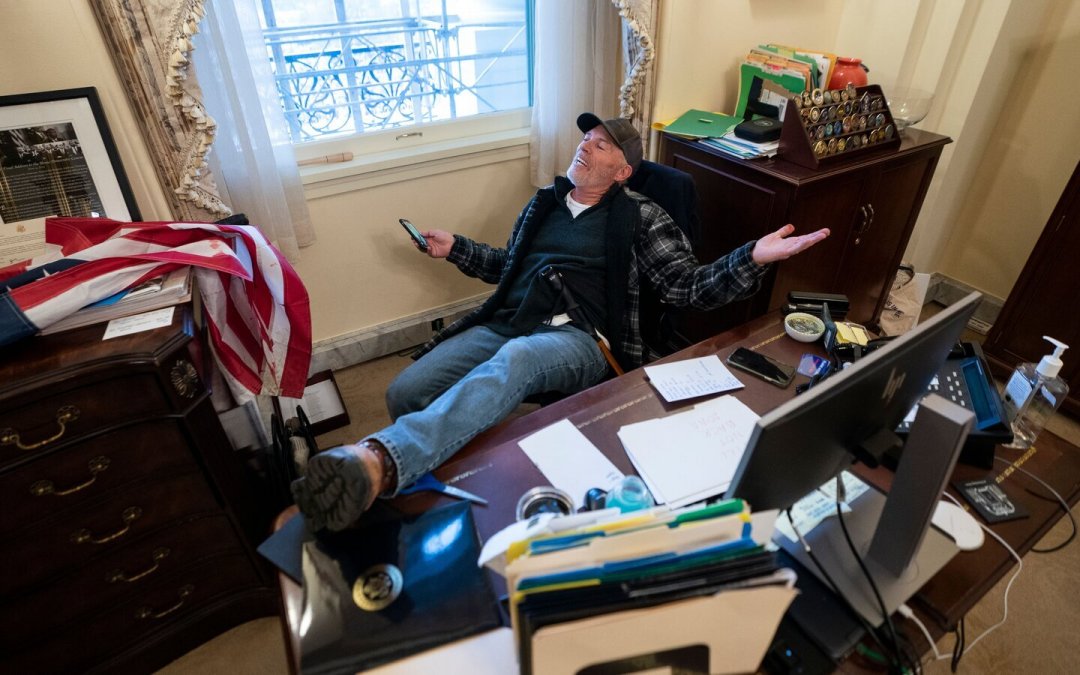WASHINGTON – Over two years after the Jan. 6 attack on the U.S. Capitol, the trial is underway for an Arkansas man who is the subject of one of the most well-known images from the day.
Richard Barnett was photographed with his feet on a desk in then-House Speaker Nancy Pelosi’s office on Jan. 6. Shortly after, he was indicted by a federal grand jury on seven counts for his role in the attack at the Capitol.
The charges include entering and remaining in a restricted building or grounds with a deadly or dangerous weapon; obstructing an official proceeding; and theft of a government property. An eighth charge for civil disorder was added in late December 2022.
Barnett, who is in his early 60s, has pleaded not guilty to all charges. Emily Berret, Pelosi’s former deputy chief of staff, was the first person the prosecution called to testify this week. Although she did not see Barnett in-person on Jan. 6, it was her desk on which Barnett rested his feet. She said that his action was a breach of her “personal space.”
Defense attorneys argued that Barnett entered the Capitol about 15 minutes after Berret and the former House speaker had arrived at a secure location. But she testified that Barnett was still responsible for halting the proceedings of the day.
“Anyone who entered the Capitol, no matter what time that day, interfered with our work,” said Berret, who worked for Pelosi for nearly a decade.
Prosecutors say Barnett brought a high-voltage stun gun – capable of delivering a 950,000-volt shock – with him to the Capitol.
Barnett’s possession of a ZAP Hike n’ Strike hiking staff was discussed further on Thursday, when Billy Pennington, the president of Personal Security Products, highlighted the weapon’s ability to penetrate skin and knock people unconscious, but maintained that it is not lethal.
Capt. Carneysha Mendoza, a Capitol Police officer, said during her testimony on Wednesday that such devices are prohibited from the complex.
During Mendonza’s cross examination, the defense began making a distinction between “unethical protestors,” and “ethical protestors.” Lawyers for Barnett said there were several groups who arrived at the Capitol on Jan. 6 with the intention to be violent, such as the members of the Proud Boys and Oath Keepers.
Mendoza replied that while she did not encounter Barnett during the attack, she has no reason to believe Barnett engaged in violence, touched any police officers or broke barriers that day.
Leading up to the trial, Barnett’s lawyers argued that the former firefighter’s actions on Jan. 6 were grounded in political protest, according to the Associated Press. Barnett told 5News, a CBS-affiliate in Arkansas, that he entered Pelosi’s office suite looking for a bathroom.
In an interview on the day of the riot, which was played by the prosecution, Barnett said, “I came to peacefully protest. I didn’t break in. I got pushed in.”
The prosecution maintained that the means by which Barnett entered the Capitol are irrelevant. It stressed that the Capitol was closed to the public on Jan. 6 because Congress was certifying the 2020 presidential election and the pandemic. Therefore, anyone who entered the grounds did so illegally.
Barnett, a native of Gravette, Ark., who is nicknamed “Bigo,” also allegedly took an envelope from the former speaker’s office. Barnett told The New York Times in January 2021 that he didn’t steal it because he put a quarter on the desk. He also left behind a note that said, “Nancy, Bigo was here, you bitch,” according to court documents.
During the defense’s cross examination of Berret, lead attorney Joseph McBride reinforced the defense’s belief that Barnett did not steal the envelope. He asked Berret if she would consider it “fair compensation” if the average person went into her house, took an envelope and left her a quarter in return.
“I would wonder how they got into my house, but yes,” she replied, later affirming that she would report the individual entering her home to law enforcement. She also said she threw the quarter in the trash when she returned to her office because it was contaminated with blood.
McBride, who has defended several other individuals charged in connection to Jan. 6. McBride is an avid Trump supporter and previously called prison for Jan. 6-pretrial detainees “Guantánamo Bay for American citizens.”
The trial has been repeatedly postponed because of McBride’s health – he was diagnosed with Lyme disease in July. In court on Monday, he said he was still suffering from long Covid.
Brad Geyer, another lawyer representing Barnett, spent 21 years as a trial attorney for the Department of Justice earlier in his career.
The prosecution’s final witness on Wednesday was Gerald Stutte, an asset protection employee at Bass Pro Shops. Stutte testified that Barnett purchased a stun gun, pepper spray, radios and other items from a store in Arkansas one week before Jan. 6.
“He came prepared for violence,” the prosecution said during its opening statement Tuesday.
The defense is expected to make its opening statement once the prosecution rests its case.

